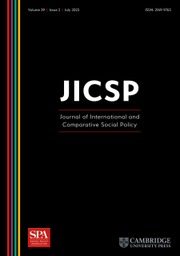Article contents
Power relationships and the formulation of anti-poverty policies in emerging countries: the case of Palestine†
Published online by Cambridge University Press: 09 March 2020
Abstract
The process for developing social policies in the Palestinian Territories has undergone several changes in recent years. Most recently, the Palestinian National Authority (PNA) formally adopted the partnership approach whereby policies are developed with participation by the civil society sector and international donor organizations. However, it is unclear whether these partnerships have been realized as little is known about the power relationships between PNA and these other parties. Using a qualitative case study design, data were collected through semi-structured interviews with 16 Palestinian ministry officials and a review of archival materials. The findings confirmed that Palestinian agencies, civil sector organizations, and international donor organizations are now helping formulate anti-poverty policies. However, the partnerships are far from balanced or equal. Due to strained relationships with the PNA characterized by tension, conflict, and competition, the influence of the civil society sector remains modest. Conversely, international donor organizations continue to exert extraordinary influence on the policy-making process through financial and technical assistance. Implications for policy and future research are discussed.
Keywords
- Type
- Research Article
- Information
- Journal of International and Comparative Social Policy , Volume 31 , Issue 1 , February 2015 , pp. 34 - 50
- Copyright
- Copyright © 2014 Taylor & Francis
Footnotes
An earlier version of this paper received the Outstanding Student Paper at the 2012 Society for the Study of Social Problems annual conference in the Sociology and Social Welfare Division.
References
- 4
- Cited by


